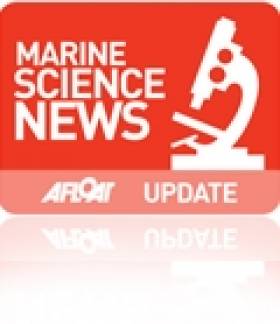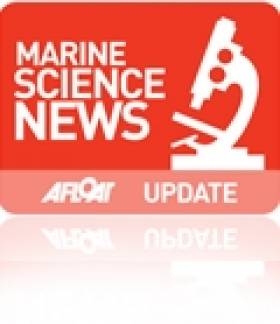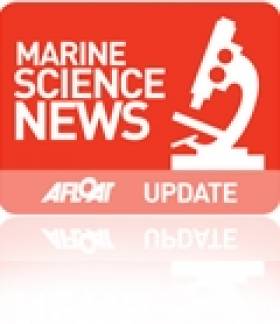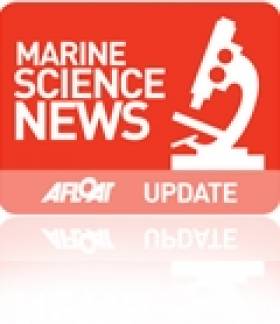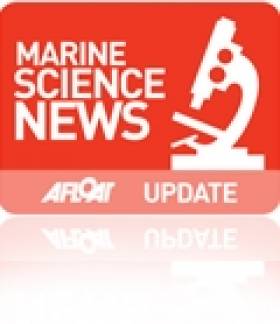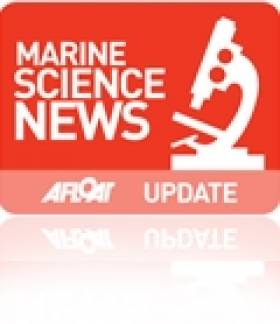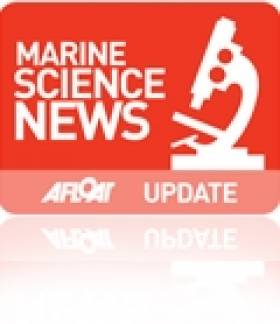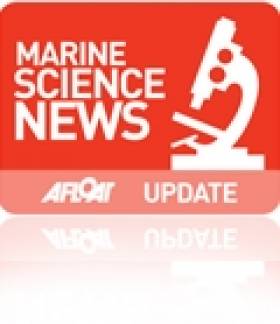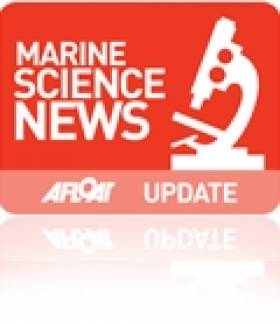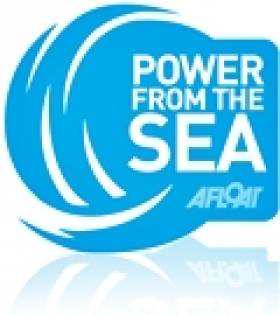Displaying items by tag: marine science
Irish Coastal Water Quality 'Generally Good' Says Final Report On Biological Effects & Chemical Measurements
#MarineScience - The final report for Biological Effects and Chemical Measurements in Irish Marine Waters has just been published after four years of collaborative research led by Trinity College Dublin in partnership with the Marine Institute, Shannon Aquatic Toxicity Laboratory (Enterprise Ireland) and Dublin Institute of Technology.
The marine environment is affected by a complex mixture of man-made and naturally-occurring substances derived from a variety of sources such as shipping, sewage or industrial discharges or through accidental or historic spills of hazardous substances.
“Current monitoring and assessment of the pollution status of the marine environment in Ireland is mainly reliant on chemical measurements of contaminants in sediments, water and in 'bio-indicator' species," said Prof Jim Wilson of TCD.
"The success of this pilot project is that it reports the first major Irish study that examined both pollutant levels in the coastal environment while concurrently assessing the potential for biological-based effects on organisms exposed to these often hazardous substances."
Drawing on diverse expertise provided by a number of Government and academic research institutions, the study completed testing of a variety of chemical and biological-based monitoring tools in diverse coastal locations in Dublin, Wexford, Cork, Kerry, Clare and Galway.
The project confirmed that Irish coastal water quality is generally good, with the most elevated pollutant levels detected typically at more populated locations subject to greater impacts and pressures.
Lower pollutant levels were generally evident in less populated areas where diffuse pollution rather than local sources are of greater relevance.
In isolation, chemical measurement studies do not always explain the potential of the pressures that affect the ecosystem as a whole. The findings of this report note that using a suite of biological effects as part of an integrated approach to support chemical measurements gives a better overview of the health of our marine ecosystem.
For example, chemical compounds and mixtures present in the environment in combination with natural changes in the ocean, such as salinity or temperature, can all work in synergy or against each other to elicit diverse effects on the marine environment and on resident marine species.
“Individual pollutants or a mix of chemicals can cause metabolic disorders, increases in diseases becoming more common, as well as having an adverse effect on population growth and on species reproduction potential," said Dr Michelle Giltrap of TCD.
"An example of this is the reproductive effects on dog whelks, which were affected by the legacy of exposure to the biocide Tributyltin (TBT). TBT was widely used as an effective antifoulant on the hulls of ships and boats to prevent growth of aquatic organisms. Although use of TBT has been phased out internationally, the effects are still evident, but have been diminishing over time."
Dr Brian Donlon, who manages the Environmental Protection Agency's Research Programme, said “ongoing international commitments under the Marine Strategy Framework Directive require that member states monitor pollution in their marine waters by assessing both the level of chemical contamination and the effects of this contamination on organisms.
"Continued research and monitoring is required in order to further develop the dedicated chemical measurement and ecotoxicological response datasets.”
Dr Brendan McHugh of the Marine Institute added: “Integrated biological effects and chemical monitoring, including use of the novel tools, offer the potential for a more ecologically oriented approach to pollution monitoring and for further enhancing and supporting management actions in maintaining a sustainable marine environment."
The full report is available HERE on the Marine Institute’s Open Access Repository. The research project and was carried out under the Sea Change Strategy and the Marine Sub-Programme of the National Development Plan 2007-2013, and was jointly funded by the EPA and the Marine Institute.
Science Students Study Cold Water Coral Ecosystems In Irish Waters
#MarineScience - The national research vessel RV Celtic Explorer has become a ‘floating university’ for 14 postgraduate students from seven countries – including Ireland – who have a unique chance to study cold water coral systems in their living environment in Irish waters.
The Atlantic Summer School, which runs till 17 September, involves a multidisciplinary investigation of cold water coral ecosystems of the Belgica Mound Province, which is a special area of conservation (SAC) some 150km south-west of Ireland.
As previously reported on Afloat.ie, the initiative is a collaboration between the Strategic Marine Alliance for Research and Training (SMART) in Ireland and the Alfred Wegener Institute Helmholtz Centre for Polar and Marine Research (AWI) in Germany.
“Cold water corals live at ocean depths of around 1,000m and build reefs which over millennia can reach up to 300m high," explained Dr Pauhla McGrane, national co-ordinator of SMART Ireland. "These giant coral mounds act as biological “hot-spots” and provide habitats for a variety of marine life.
“The Atlantic Summer School will enable postgraduate students to survey these mounds and collect data that will ultimately increase our understanding of these unique environments," she added.
“It’s not everyday that students get a chance to explore the ocean’s seabed gaining vital skills for exciting careers”, said Prof Andy Wheeler, Head of Geology at the School of Biological, Earth and Environmental Sciences in University College Cork. “Whenever we get a chance to get out there, we always find something new which changes our perspective on how this planet functions.”
The Atlantic Summer School includes a one-day sea survival training course for marine science students at the National Maritime College of Ireland in Cork, as well as distance learning and pre- and post-survey workshops at UCC and NUI Galway.
“This pooled infrastructure and expertise from Ireland and Germany’s higher education institutes provides an incredible chance for postgraduates to get the necessary practical experience and develop networking opportunities they need early in their careers,” said Prof Karen Wiltshire, vice-president of AWI.
“We are all delighted to be part of this strategic collaboration, which will ultimately develop career pathways and mobility for students between the island of Ireland and Germany and increase multidisciplinary research capacity in Atlantic nations.”
Marine Institute chief executive Dr Peter Heffernan congratulated all involved in the initiative, saying: “It’s essential to learn more about the ocean as it the life support system for our planet. We’re proud to be part of this and to support this unique training opportunity for our future ocean explorers.”
The 2015 Atlantic Summer School will take place onboard the RV Polarstern on an Atlantic meridional transect from Bremerhaven, Germany to Cape Town, South Africa and will provide eight Irish marine science students with the opportunity to conduct research.
For further information visit the SMART website or contact [email protected].
Inland Fisheries Ireland Opens New Research Facility in Galway
#MarineScience - Inland Fisheries Ireland (IFI) has officially opened a new laboratory at its research facility on its National Index Sea Trout Catchment (River Erriff) at Aasleagh Lodge in Leenane, Co Galway.
IFI says it will continue to invest resources in the Erriff research station, as the outputs from research conducted here will be vital for the future conservation and management of sea trout.
International sea trout expert Dr Graeme Harris, who gave the keynote address at the launch, congratulated IFI on its renewed focus on sea trout and emphasised the importance of world class science on this iconic species.
While research and data collection on both salmon and sea trout has taken place at the Erriff research facilities for over 30 years, a significant new research programme was initiated at the Erriff in 2014.
This new study, which saw the release of sea trout fitted with acoustic tags to sea, aims to investigate migration, distribution, habitat usage and survival of sea trout and salmon smolts in the marine environment on the west coast of Ireland.
Speaking at the launch, IFI chief executive Dr Ciaran Byrne said his organisation "is committed to applied scientific research that is designed to answer important conservation and management questions.
"We have prioritised research on sea trout and are fortunate to have these excellent facilities at this location. We rely on excellent data and scientific analysis which informs future management decisions.”
The Erriff fishery is located at the head of Killary Harbour near the village of Leenane in Connemara. The fishery was purchased by the Irish State from Lord Brabourne in 1982 and has since operated as a salmon and sea trout angling and research fishery.
The river has a large lake in its headwaters, Tawnyard Lough, and a downstream fish trap has operated at the lake exit since 1983. This facility allows assessment of sea trout stocks on an annual basis.
Explorers Programme Opens To Northwest Region Primary Schools
#MarineScience - Applications for the Explorers Education Programme are now open for primary schools in Galway, Clare, Mayo and Sligo that wish to take part in marine-related activities and workshops for the 2014/2015 school year.
“With over 50 primary school groups participating in the revised programme last year in Galway, we are delighted to announce the revised modules are now also being offered in Counties Clare and Mayo," said Explorers education officer Dr Noirin Burke, who added that "with support from Sligo Education Centre, we are also extending a pilot programme of Explorer workshops to be held at the centre.”
The new module system allows for more students and teachers to get involved in marine projects, seashore safaris, having aquariums in the class, or taking part in a number of exciting marine workshops involving maths, engineering and science.
Teachers can send their applications to their local educations centres in Counties Galway, Clare, Mayo and Sligo highlighting how the Explorers Education Programme will be beneficial to their class, school and community.
The modules include:
- Explorers Aquarium in the Classroom: This involves students running a saltwater aquarium of native species for up to four weeks in their classroom.
- Explorers Marine Project: Students will learn about materials and energy and forces, using the theme of 'the marine and our ocean'.
- Explorers Seashore Safari: Accompanied by the Explorers education officer, the students will visit their local shoreline to examine the plant and animal life present and their adaptations to life.
- Explorer Workshops at Galway Atlantaquaria: Workshops will be carried out at Galway Atlantaquaria between October 2014 and February 2015, which include maths, engineering and science.
There is also a module for primary schools in Co Sligo. whereby Explorer workshops will be carried out at Sligo Education Centre by the Explorers education officer, introducing students to the marine through experiments and hands-on activities.
For more information about the modules and workshops, please see the Explorers Marine Education Programme Application Form. For further queries contact Dr Burke at [email protected].
The Explorers Education Programme continues to run in Dublin and Cork in association with Blackrock Education Centre, Sea Life Centre Bray and the Lifetime Lab Cork. More information about their workshops will be issued later in the year.
Explorer teaching materials are available to download free of charge at www.explorers.ie
Marine Biotech Partners Meet At Marine Institute
#MarineScience - The Marine Biotechnology ERA-NET (ERA-MBT) partners, a consortium of 19 national funding bodies from 13 European countries, met at the Marine Institute in Galway last week from 3-4 September to co-ordinate a collective approach to funding trans-national marine biotechnology research and innovation projects.
Marine biotechnology research involves the use of marine bio-resources including fish, algae, bacteria and marine invertebrates, either as the source or the target of biotechnology applications.
Our oceans are home to an abundance of marine bio-resources that can be used in food, chemicals, industrial materials and the health sectors. Marine biotechnology can help to unlock the potential of marine bio-resources as well as enable the production of an array of new products such as novel food sources, pharmaceuticals, fertilisers and cosmetics.
“The new collaborations to be supported by the ERA-MBT project will see academic and industry researchers working on innovative products and processes that will contribute to the development of sustainable food sources; improving our health; as well as helping to address marine related environmental issues,” said Dr Dermot Hurst, representing the Marine Institute.
Dr Hurst is responsible for defining the strategy of how the ERANET will enable new research and innovation and the creation of new approaches to transnational funding for marine biotechnology research and innovation activities.
“The ERA-MBT project is directly relevant to and supportive of Ireland’s Harnessing Our Ocean Wealth national strategy which identified the development of marine bio-resources as one of a number of new and emerging opportunities,” he said.
Major tasks completed during the Galway meeting included finalising the structure and content of the first call for research proposals from the ERA-MBT and plans for a major stakeholder workshop to be held in Lisbon on the 28-29 October. More information on the project can be found at www.marinebiotech.eu.
Legacy Report Concludes Four-Year European Marine Research Programme
#MarineScience - The recent publication of the SEAS-ERA Legacy Report brings to a successful conclusion the four-year work programme of the SEAS-ERA Network, a consortium of 21 European marine research funding organisations (RFOs) from 18 member and associated member states.
Key SEAS-ERA deliverables included the preparation of a vision and the identification of priority research issues to be addressed in each of the three sea basins studied: the Atlantic, the Mediterranean and the Black Sea.
The Atlantic Sea Basin Working Group, led by Ireland's Marine Institute and the European Marine Board, included partners from 10 of the 11 European Atlantic seaboard countries (excluding Denmark) stretching from Norway andIceland in the north to Spain and Portugal in the south.
Key deliverables of this group included a draft Marine Research Plan for the European Atlantic Sea Basin discussion document in October 2011; a summary report on Marine Research Infrastructures in the Atlantic Region in October 2012); and Towards a Strategic Research Agenda/Marine Research Plan for the European Atlantic Sea Basin in November 2013.
“The SEAS-ERA Project has made a significant contribution to identifying agreed marine research priorities to be addressed in the Atlantic Sea Basin," said Geoffrey O’Sullivan of the Marine Institute. "This work has fed into the EU Atlantic Strategy (2011) and the Regional Atlantic Fora Workshops (2012-2013) which in turn informed the EU Atlantic Action Plan (2014-2020).
"The priority research topics identified in the EU Atlantic Action Plan are also consistent with national marine policy (Harnessing Our Ocean Wealth) and topics identified for transatlantic EU-USA-Canada Marine Research Co-operation as defined in 2013 in the Galway Statement on Atlantic Ocean Co-operation.
"These priority topics provide an agenda for co-operative EU (HORIZON 2020, INTERREG-V, etc) and member state marine research funding programmes over the period 2014 to 2020”.
For further information on the SEAS-ERA project and to download SEAS-ERA reports visit www.seas-era.eu.
SMARTSkills Workshop For Marine Researchers In Galway This Month
#MarineScience - The Strategic Marine Alliance for Research and Training (SMART) and the Marine Institute will host a one-day SMARTSkills 2014 workshop on Wednesday 27 August in Oranmore, Galway.
This workshop is aimed at preparing early-stage researchers in developing successful proposals in order to secure shiptime in 2015 on the national research vessel RV Celtic Voyager.
The 2015 competitive shiptime call will make available 30 days on board the RV Celtic Voyager in mid-summer 2015 for graduate, postgraduate and postdoctoral led surveys.
This presents an opportunity for emerging marine scientists to design, plan, secure funding and lead a research survey that will contribute data to current research programmes as well as further developing the skills, knowledge and expertise required for a career in ocean research.
The workshop will specifically focus on the following areas:
- Upcoming 2015 shiptime call and online application procedure
- Available infrastructure, equipment and instrumentation
- Developing successful shiptime proposals and tips for success
- Planning and designing a research survey at sea
- Supports for gaining offshore experience and skills
- Break-out sessions and networking for multidisciplinary collaborations
SMARTSkills 2014 will take the form of a colloquium for presentations and networking. Participants will have the opportunity to introduce themselves and their research interests through flash presentations (two minutes, one slide) to facilitate networking.
Focused break-out sessions will stimulate discussions amongst peers and meld these goals into potential collaborative multidisciplinary surveys or complementary shiptime proposals based on disciplines or study areas.
And a ‘proposal surgery’ will allow expert scientists to analyse and advise on preliminary shiptime proposals and input on survey plans.
Registration for this workshop is free and open to all marine-related graduate, postgraduate and postdoctoral students from across the island of Ireland. Registration forms should be submitted no later than Thursday 21 August.
A draft workshop schedule is available, as are practical logistical instructions on travelling to the Marine Institute and participating in the workshop.
For further details contact the SMART team at [email protected].
Marine Institute Pays Tribute To Dr Kostas Nittis
#InMemoriam - The Marine Institute was saddened to hear of the untimely passing of esteemed colleague and friend Dr Kostas Nittis of the Hellenic Centre for Marine Research in Athens.
A distinguished oceanographer, Dr Nittis served the marine science community as secretary general of the European Global Ocean Observing System (EuroGOOS) and as chair of the European Marine Board.
But his sphere of influence extended well beyond his own research field. Through participation in multiple pan-European projects and networks, Dr Nittis was described by the Marine Institute as "a true ocean champion and ambassador, ceaselessly promoting of marine science and setting the European marine research agenda.
"Those fortunate to have known and worked with Kostas will remember his wisdom, integrity, diplomacy and a steady calmness which concealed a determination to effect positive change."
Funding For New Research On Galway Coastal Climate
#MarineScience - Research funding of some €96,000 has been awarded to NUI Galway to study the marine environment of Galway Bay - and what that information can mean for those who live around it.
As the Galway Advertiser reported earlier this month, the funding has been awarded through the Enterprise Partnership Scheme for a marine science project that will involve researchers from both NUI Galway and DCU in tandem with the SmartBay Ireland initiative, collecting data that could help in more accurate weather and climate modelling.
That kind of information could prove crucial to a city that bore the brunt of this year's winter storms and experienced unprecedented levels of flooding, particularly in the economically important areas of Salthill and the Spanish Arch.
The Galway Advertiser has more on the story HERE.
#OceanEnergy - A University College Cork project to investigate "nonlinear wave-current interactions in the nearshore" for the development of Ireland's ocean energy industry has been awarded a research grant worth more than half a million euro by Science Foundation Ireland (SFI).
David Henry's marine science research, approved under the 2013 Career Development Awards, is one of 40 projects receiving funding under SFI's double-headed grant scheme that totals some €23 million via the Department of Jobs, Enterprise and Innovation.
"Funding for researchers at the outset of their careers is an important element of the Government’s strategy for job creation in research and innovation under our Action Plan for Jobs," said Innovation Minister Sean Sherlock at the announcement on Tuesday 8 July.
"SFI’s funding schemes for early career researchers help ensure that excellent research with the potential for real economic and societal impact is properly supported in Ireland. Investment like this is important for Ireland’s developing international reputation for excellent research with impact."
SFI has more on the story HERE.



























